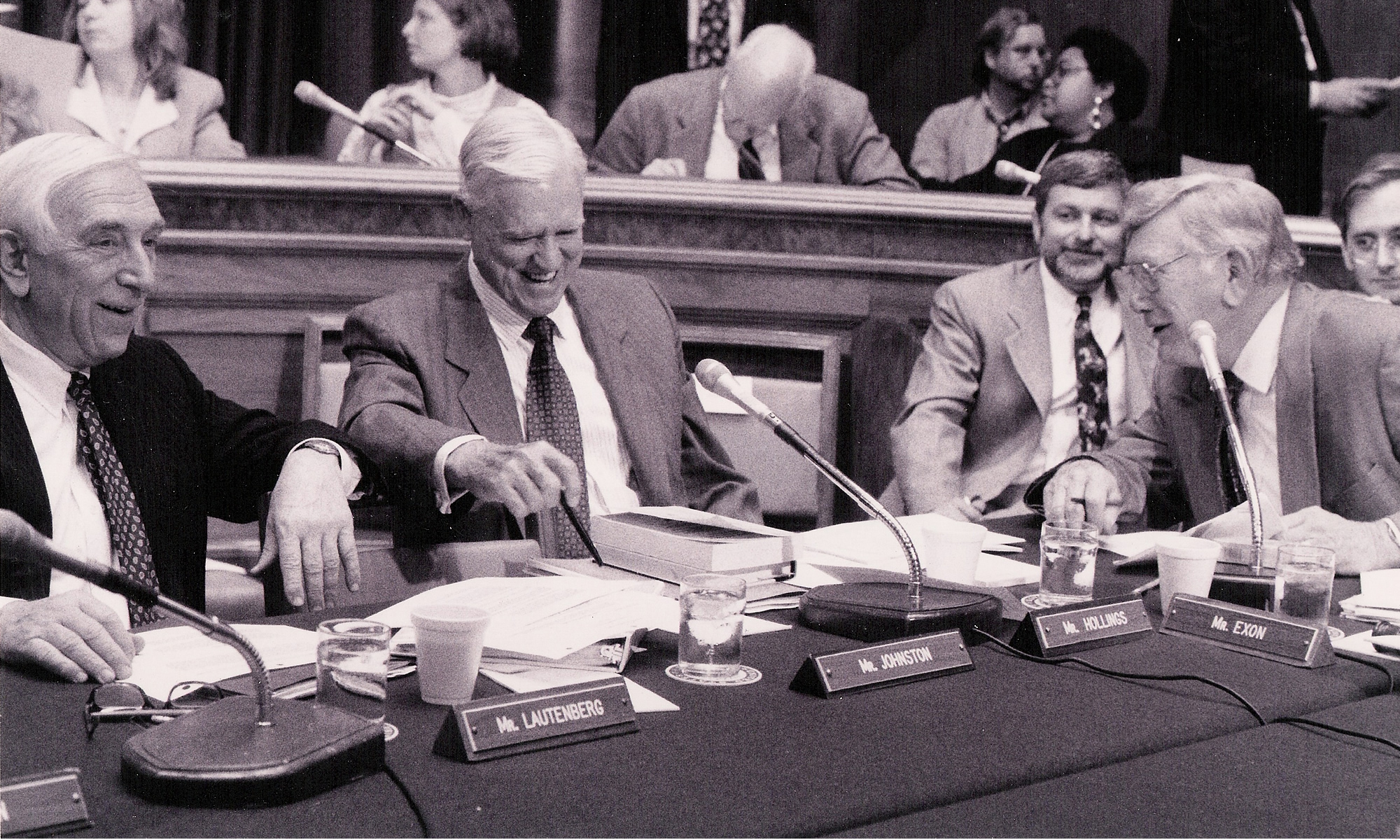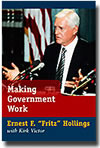 U.S. Sen. Fritz Hollings’ lifetime of public service left legacies throughout South Carolina and in the federal government. His five decades of success are summarized in these categories arranged alphabetically:
U.S. Sen. Fritz Hollings’ lifetime of public service left legacies throughout South Carolina and in the federal government. His five decades of success are summarized in these categories arranged alphabetically:
- Budget policy
- Civil rights
- Conservation
- Economic development
- Education
- National security
- Ocean policy
- Public health
- Public interest
- Public safety
- Trade and manufacturing
BUDGET POLICY: Fighting for Fiscal Conservatism
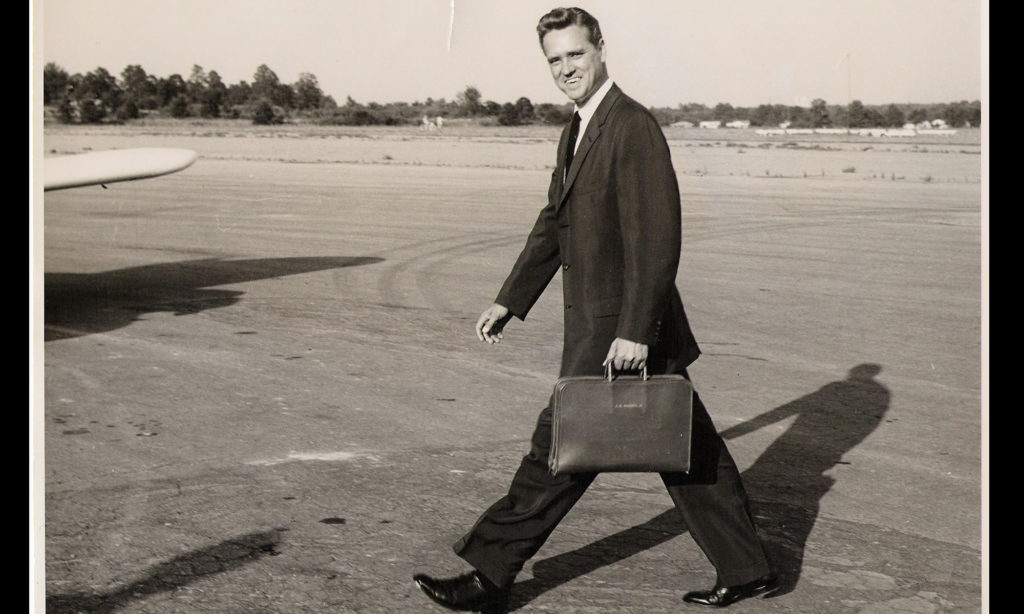
Schooled as governor in the benefits of balanced budgets, U.S. Sen. Fritz Hollings, a long-serving member of the Senate Budget Committee — has been the Senate’s most relentless foe of federal deficits. After opposing the supply-side tax cuts of the early 1980s, he attempted to reign in the Reagan-era budget deficits by proposing the “Fritz Freeze” (to freeze the budget at previous-year levels) and co-authoring the landmark Gramm-Rudman-Hollings Deficit Reduction Act of 1985. He served as an often lonely but tireless voice opposing the looting of surpluses in the Social Security and Medicare trust funds in order to hide the true size of the deficit.
- Balanced South Carolina’s budget within three years as governor
- Achieved the first AAA credit rating of any Southern state
- Sustained a 38-year effort to improve the nation’s finances and eliminate the federal debt
- Relentless advocate of “truth in budgeting” and protection of the trust funds
- Helped to create the Senate Budget Committee, and chaired it from 1980-81
- First to recognize the scope of the federal deficit problem in the 80s, and offered his own budgetary solution, the budget freeze (“the Fritz Freeze”)
- Co-authored the landmark Gramm-Rudman-Hollings deficit reduction legislation
- Courageously voted for the 1993 Deficit Reduction Act, which dramatically improved the government’s financial position
- Authored the Budget Act’s Sec. 13-301, which mandates that the President and Congress, when reporting a budget, do not count Social Security surpluses.
- Amended 1999 budget to require that any budget surpluses be used to save Social Security first
- Worked in the 2000s to restore fiscal responsibility and reverse the growing deficit:
- Called for return to one-year budgeting and “pay-as-you-go” rules
- Advocated a budget freeze excluding homeland security and defense, which he put into practice in authoring the FY ’02 Commerce-Justice-State appropriations bill
- Introduced a value-added surtax to pay for the war and peacekeeping in Iraq
- Introduced legislation to freeze future-year tax cuts
- Introduced legislation to end to the practice of using Social Security fund surpluses to pay for tax cuts
- Introduced legislation to halt the use of trust fund surpluses to mask the true size of the federal deficit.
CIVIL RIGHTS: Rallying South Carolinians to Peaceful Change
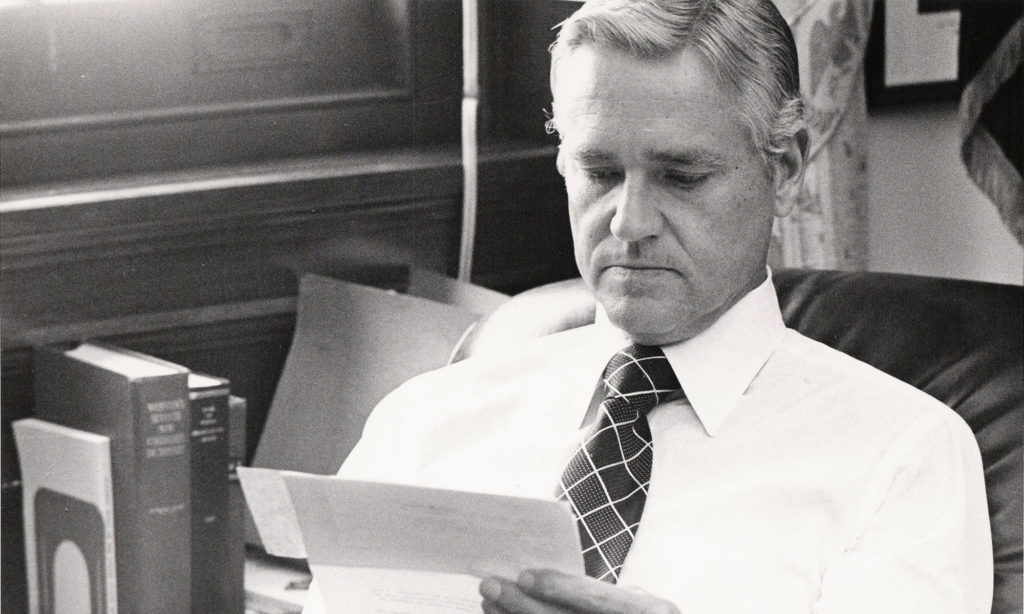
At a time when other Southern governors were pledging “massive resistance” and threatening to “stand in the schoolhouse door,” Hollings led South Carolina non-violently into the civil rights era. Using his bully pulpit as governor, he rallied South Carolinians to support “a government of laws not of men” (as he put it in his farewell address) and orchestrated the peaceful integration of Clemson University in 1963.
As a United States senator, he opposed all amendments seeking to weaken the 1982 Voting Rights Act, and he authored legislation to strengthen federal authority to prosecute church burning crimes. He appointed Matthew Perry as the first African-American district court judge in South Carolina, Margaret Seymour as the first African-American female federal district court judge in South Carolina, and Ralph Everett as the first African-American staff director of a U.S. Senate committee. In recent years, he’s led efforts to recognize and preserve historic and cultural landmarks in South Carolina including Beaufort County’s Reconstruction Era sites, the Penn Center and Gullah/Geechee sites.
- Led the peaceful integration of Clemson University, initiated the integration of the technical college system and law enforcement, and set the course for integration throughout South Carolina
- Was the only Southern senator to vote against all weakening amendments of the 1982 Voting Rights Act
- Authored legislation to strengthen federal authority to prosecute those involved in church burnings
- First to hire an African-American chief of staff of a Senate committee
- Won the King Center’s prestigious Martin Luther King Government Social Responsibility Award in 1986, and received an honorary degree from Tuskegee University in 1989
- Recognized for his strong civil rights record, Hollings was invited to deliver the keynote address at the 50th Anniversary Briggs v. Elliott Descendants Reunion Banquet
- Authored legislation to posthumously award the Rev. Joseph A. DeLaine with the Congressional Gold Medal for his sacrifices to desegregate S.C. public schools
- Secured funding for the historic preservation, restoration and rehabilitation of the Penn Center in Beaufort County.
CONSERVATION: Rescuing South Carolina’s Unique Ecology
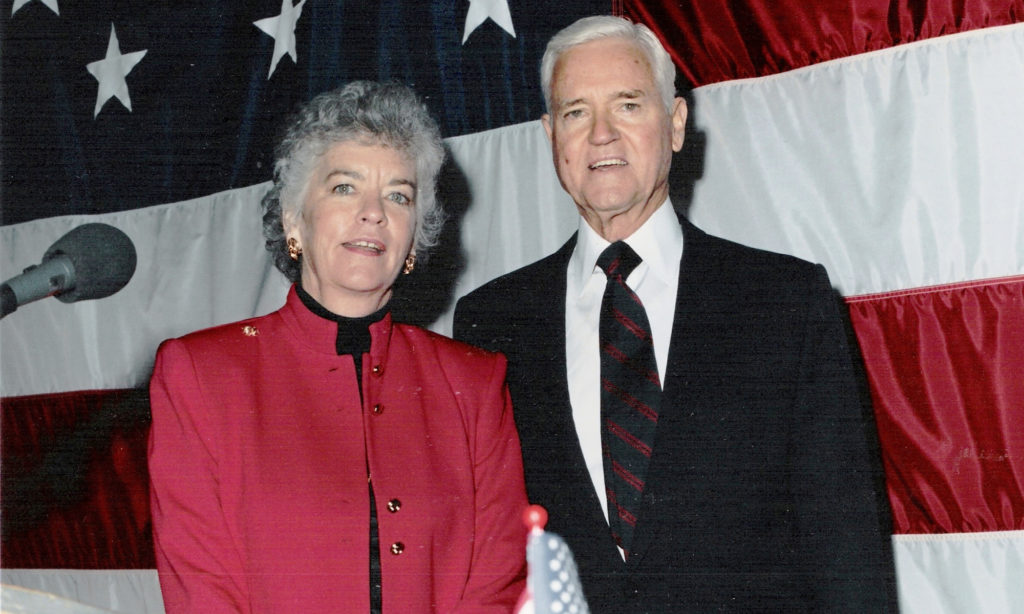
Emphasizing “practical conservationism,” Hollings co-authored legislation to create the Congaree Swamp National Monument; secured funding necessary to purchase land for the monument; and is currently spearheading the monument’s designation as South Carolina’s then-sole national park. He helped to broker cooperative efforts to preserve the ACE Basin by securing the federal designation as well as funding for every acre contained in both the ACE Basin National Wildlife Refuge and the ACE Basin National Estuarine Research Reserve. He secured federal funding to expand the Sumter National Forest around Lake Jocassee, the Francis Marion National Forest near McClellanville, and wildlife refuges at Waccamaw and Cape Romain. He also led efforts to conserve the portions of the Cooper River known as Bonneau Ferry.
- Secured funding to protect the Congaree Swamp and authored legislation to make it South Carolina’s first national park
- Secured the funding to protect thousands of acres of South Carolina’s precious lands, including the ACE Basin, Waccamaw, and Cape Romain wildlife refuges; the Sumter and Marion National Forests; the Jocassee Gorges, the Congaree Swamp National Monument, and Bonneau Ferry.
- Co-authored the legislation and secured the all of the funding for the South Carolina Heritage Corridor
- Authored the Automobile Fuel Economy Act in 1975, the nation’s first standards to improve fuel efficiency and decrease U.S. dependence on foreign oil
- Led the fight in 1975 to repeal the oil depletion allowance, a $2.4 billion tax break for oil companies.
ECONOMIC DEVELOPMENT: Jumpstarting the New South Carolina
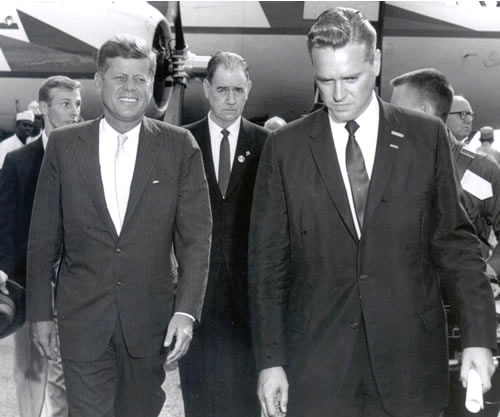
As governor (1959-63), Hollings balanced the state budget and earned the first AAA credit rating of any Southern state. Determined to create jobs and build a skilled industrial workforce, he set forth a vision for a statewide network of low-tuition, technical schools. The Hollings plan was passed by the legislature in 1961, and is now a nationally acclaimed system of 16 colleges serving more than 175,000 students annually. Gov. Hollings aggressively recruited new industries and launched South Carolina’s transformation from a low-skill, agrarian economy to a high-value modern economy that is a magnet for investment from around the world. Using his bully pulpit as governor, he rallied South Carolinians to support “a government of laws not of men” as he orchestrated the peaceful integration of Clemson University.
- Attracted international investment in S.C., led transformation from agrarian to industrial economy
- As governor, created the state’s technical education system and increased the state’s investment in public schools
- Served on the Senate Appropriations Committee starting in 1971, and achieved seniority to improve the state
- Brought extensive federal resources to the state, bolstering infrastructure, highways, water systems, law enforcement and public safety, aviation and seaport facilities, coastal research and conservation, federal prisons, and much more.
- Has served as either the chairman or ranking member of the Commerce, Science and Transportation Committee from 1981 until his retirement. He joined the committee in 1967.
- Secured funding for every port harbor dredging project, helping the Port of Charleston become the fourth-largest container port in the nation
- Co-created the Airport Improvement Program, a funding source for aviation infrastructure, and secured millions of dollars in federal funding for South Carolina’s aviation facilities
- Created the state’s public broadcasting system (now S.C. Educational Television and Radio), one of the nation’s most advanced and comprehensive public networks.
- Authored blueprint for a national, high-speed rail system, advocated extensive investment in passenger rail funding
- As a state legislator and as governor, led sustained effort to improve the state’s beleaguered K-12 schools and its universities authorizing major funding increases and reforms
- Expanded South Carolina’s “Blue Ribbon Schools” program nationally
- A leading Senate supporter of the Pell Grant and TRIO college financial aid programs
EDUCATION: Father of S.C. technical college system
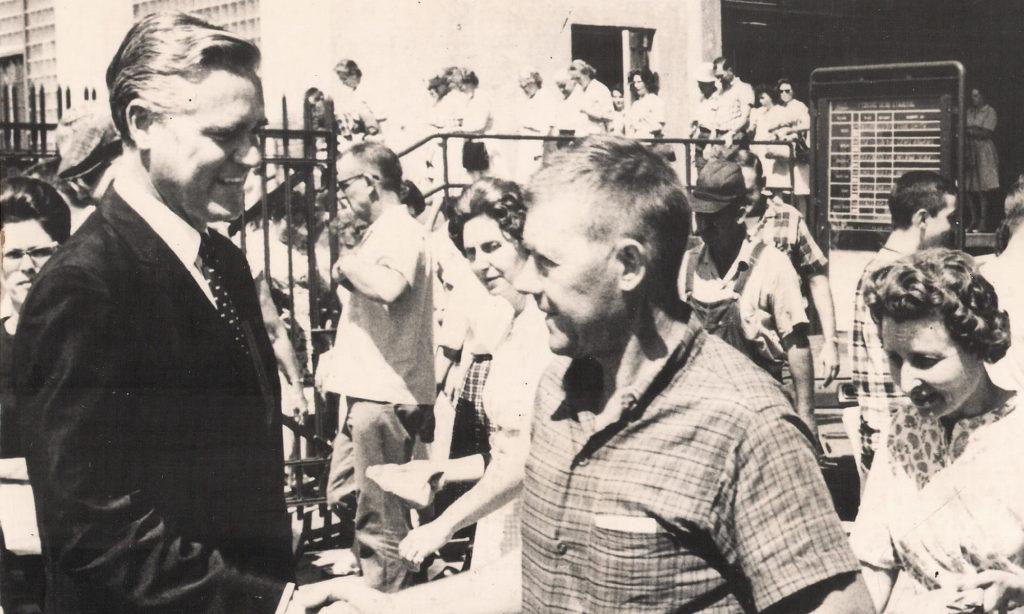
Hollings is father of South Carolina’s admired technical education system — an innovative program that has allowed hundreds of thousands of South Carolinians to have the opportunity to get more skills and better jobs. Hollings has a truly remarkable record of support for education. His achievements included:
- Successfully pushing in 1983, 1986 and 1987 to restore cuts to the U.S. Department of Education and increasing funding by $3.9 billion. In 1995, he spearheaded efforts to block $40 billion in Republican education cuts, as shown in his important amendment to restore $12 billion in cuts to student aid.
- Saving TRIO. In 1991, Hollings led the move to save a 25-year-old program that helps disadvantaged students learn about college, enter college and stay until they graduate. Despite huge cuts to many programs in the 1995 budget, Hollings targeted an 11-percent, $45 million increase toward counseling and student talent search programs. In South Carolina, the increase meant more than 2,000 low-income, underprivileged students could attend college.
- Supporting public schools. A staunch advocate of public education, Hollings led the fight against tuition tax credit proposals that promised to undercut public support and funding for schools. He also blocked “voucher” proposals to add private school funding to the public tab in 1978, 1983, 1992, 1994, 1995 and 1996.
- In 1995, Hollings ensured full funding of a national School-to-Work vocational training center at the University of South Carolina where counselors learn how to help students plan careers.
- Helped more than double the funding for Head Start from 1990 to 1995 to enhance quality programs. The additions helped working parents and improved the health and education of children over the long term.
NATIONAL SECURITY: Providing for the nation’s defense
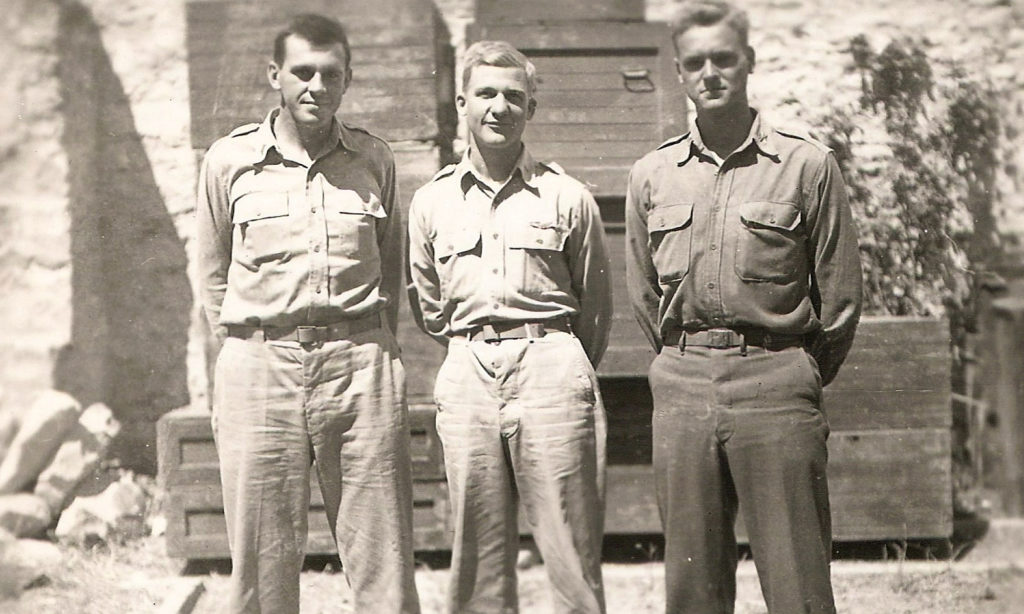
As a decorated combat veteran and, for more than three decades, a member of the Senate’s Appropriations Subcommittee on Defense, Hollings followed in a tradition of powerful Southern senators demanding — and funding — robust U.S. Armed Forces without peer on the world stage. He devoted special attention to bolstering U.S. military installations and investments across South Carolina, as well as ensuring that the U.S. government kept its promises to the veterans who sacrificed so much to defend the nation.
- A decorated WWII veteran, Hollings led an artillery unit in North African and European campaigns
- Served as senior defense appropriator for more than three decades
- Steered substantial resources to South Carolina to bolster and transform its military installations
- Led opposition to unequal arms limitation agreements with the Soviet Union in the 1980s, believing they gave away too much
- Supported numerous programs to modernize weapons and speed troop deployment, but also opposed costly arms spending, such as the unworkable MX missile program
- Was a staunch advocate of higher military pay and veterans benefits in keeping with the sacrifices of America’s fighting men and women
- Introduced legislation four times in his Senate career to reinstate the military draft to better share the burden of the nation’s defense and bolster U.S. troop strength.
OCEAN POLICY: Protecting Our Oceans and Coasts
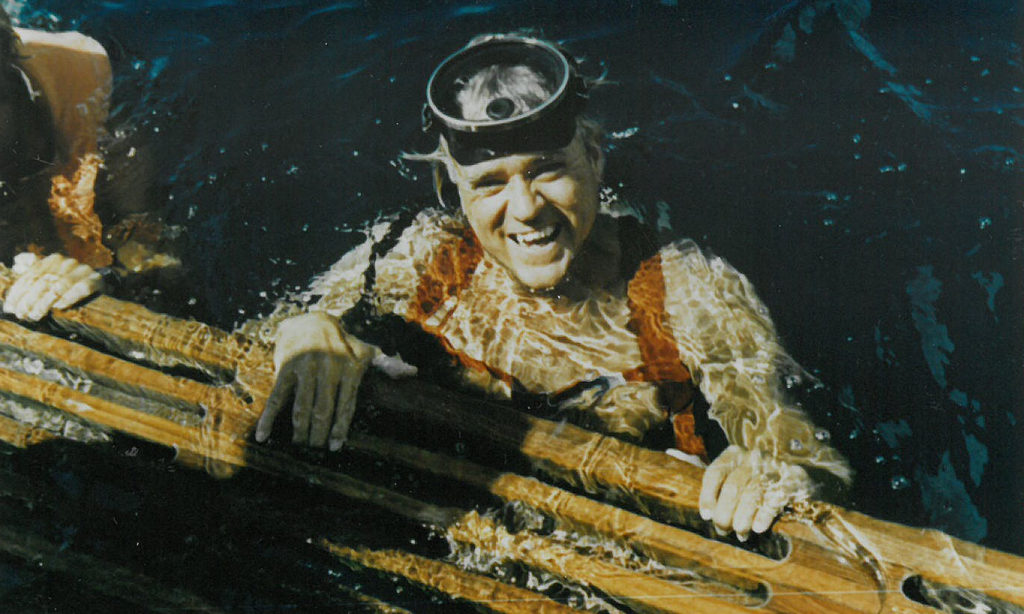
Hollings authored an extraordinary range of laws to safeguard America’s coasts and oceans, including the Coastal Zone Management Act (1972), the Marine Mammal Protection Act (1972), the Oceans Dumping Act (1976), and the Sustainable Fisheries Act (1996). He is recognized as the legislative “father” of the National Oceanic and Atmospheric Administration. In 2000, President Clinton signed into law Sen. Hollings’ Ocean Act, which created the U.S. Commission on Ocean Policy and set in motion a comprehensive review of the nation’s ocean and coastal policies. He continued to pursue his visionary approach, authoring new innovative measures: the Coastal and Estuarine Land Protection Act, and the Oceans and Human Health Act.
- “Father” of the National Oceanic and Atmospheric Administration (NOAA)
- Authored the Oceans Act of 2000, which created the U.S. Commission on Ocean Policy
- Authored the Coastal Zone Management Act, signed into law in 1972, which authorized the National Estuarine Research Reserve System
- Led passage of the Ocean Dumping Act, signed into law in 1976
- Led passage of the Sustainable Fisheries Act, signed into law in 1996
- Authored the Marine Mammal Protection Act, signed into law in 1972
- Brought NOAA marine labs to South Carolina
- Increased the national focus and priority of ocean and coastal conservation and research
- Author of the Coastal and Estuarine Land Protection Act, legislation to expand national efforts to conserve pristine coastal lands.
- Author of the Oceans and Human Health Act, legislation to establish a federal research program that examines ocean resources and their applications to human health.
PUBLIC HEALTH: Exposing Hunger, Waging War on Cancer
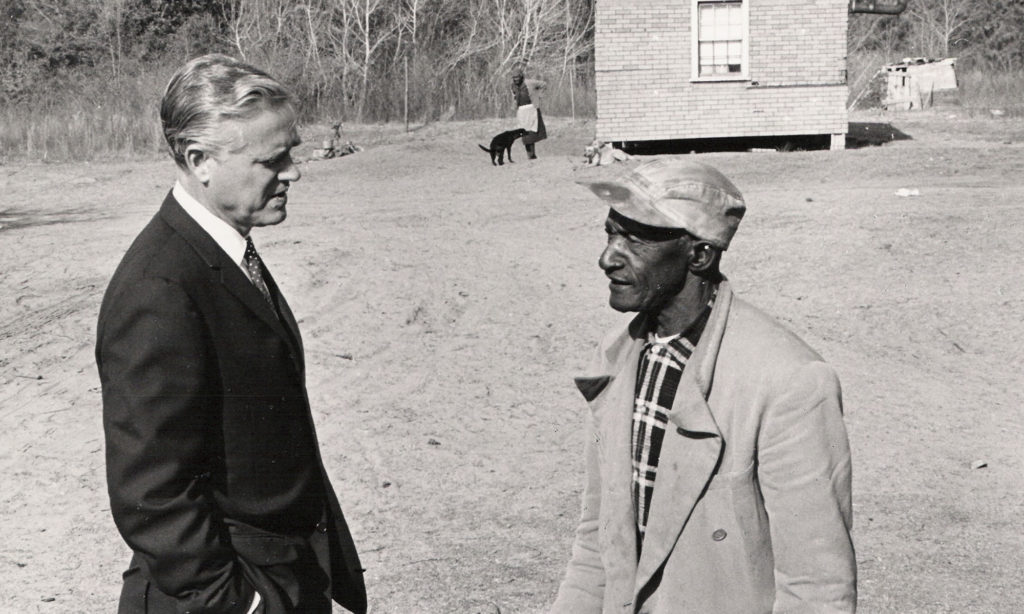
Concerned about widespread poverty across the South and in urban America, Hollings embarked in 1968 on a series of “hunger tours” to spotlight the issue, and in 1970 authored “The Case Against Hunger: A Demand for a National Policy,” which advocated programs to address persistent poverty. From 1969 to 1975, he helped lead the congressional effort to pass the Special Supplemental Food Program for Women, Infants, and Children, popularly known as WIC.
He championed development of the Community Health Center program to bring medical care to the poor. Spurred by South Carolina’s high cancer rates, he led the charge for aggressive investments in the war on cancer. He secured funding for a nationally renowned cancer research and treatment center — now known as the Hollings Cancer Center — at the Medical University of South Carolina. He authored legislation creating a nationwide program to screen women for breast and cervical cancer, and was one of the first senator’s to advocate doubling funding for the National Institutes of Health.
- Led a series of “hunger tours” across South Carolina, exposing dire poverty and third-world- like living conditions
- Authored the book “The Case Against Hunger” and led the creation of the Women, Infants and Children (WIC) nutritional assistance program
- Advanced the nation’s Community Health Centers, which provide primary and preventive health services in under-served communities
- Leading advocate for cancer and health research – one of the first Senators to advocate for doubling of the National Institutes of Health’s budget
- Secured funding to advance cancer research at the Medical University of South Carolina, building MUSC into one of the leading cancer research facilities in the nation, with a special focus on combating South Carolina’s high rates of cancer
PUBLIC INTEREST: Protecting Consumers, Securing Democracy
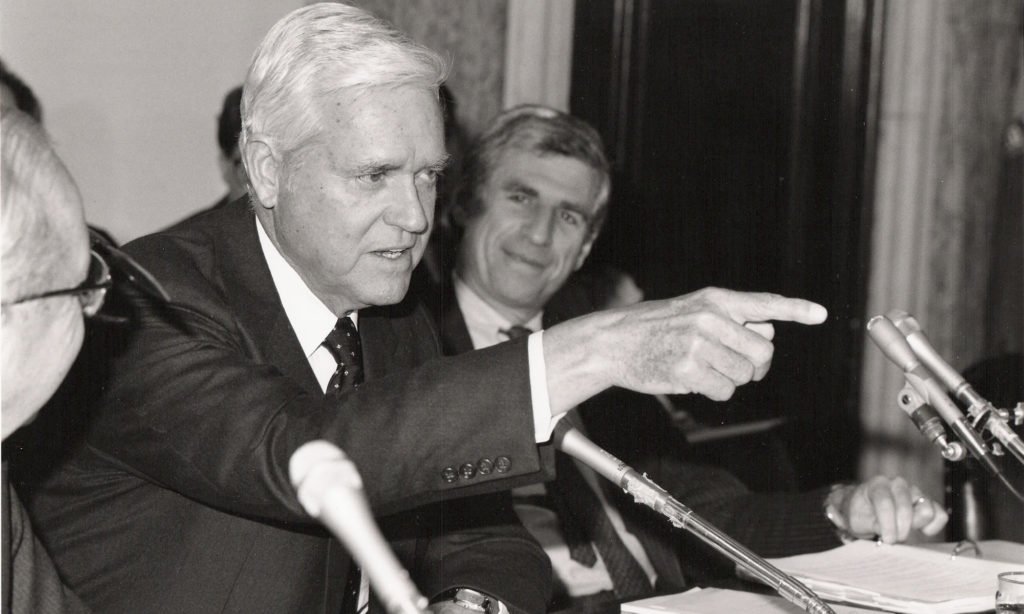
Hollings served as a legislative champion of the modern consumer movement, authoring or co-authoring a diverse array of laws to foster telecom competition, improve online privacy, safeguard personal data, protect Americans from unwanted telephone solicitations, and much more. He sought to strengthen America’s participatory democracy by advocating a constitutional amendment permitting limits on campaign expenditures (to prevent wealthy candidates from, in effect, buying elections) and co-authoring legislation to preserve a diversity of voices in the media by reinstating ownership limits and halting further concentration in broadcast media.
- Spearheading bipartisan efforts to reverse the Federal Communications Commission’s decision to relax broadcast ownership rules.
- Co-author of the 1996 Telecommunications Act, which deregulated the telecom industry, ended the Bell monopolies, and began the growth of independent telecommunications companies.
- Served as either the chairman or ranking Member of the Commerce, Science and Transportation Committee starting in 1981 until his retirement in 2005. He joined the committee in 1967.
- Authored legislation in 2000 and 2002 to strengthen online privacy and improve individual’s control over their personal data
- Authored legislation, first in 1993 and then reintroduced it seven times over the following 10 years, to protect children from excessively violent TV programming
- Authored a constitutional amendment to grant authority to Congress and state legislatures to set campaign expenditure limits and reduce the influence of money in politics
- Co-authored the legislation in 2002 that created the FTC’s “Do Not Call” List
- Authored the American Home Fire Safety Act and a lead co-sponsor of the Staffing for Adequate Fire and Emergency Response Act (SAFER)
PUBLIC SAFETY: Ensuring Safe Neighborhoods
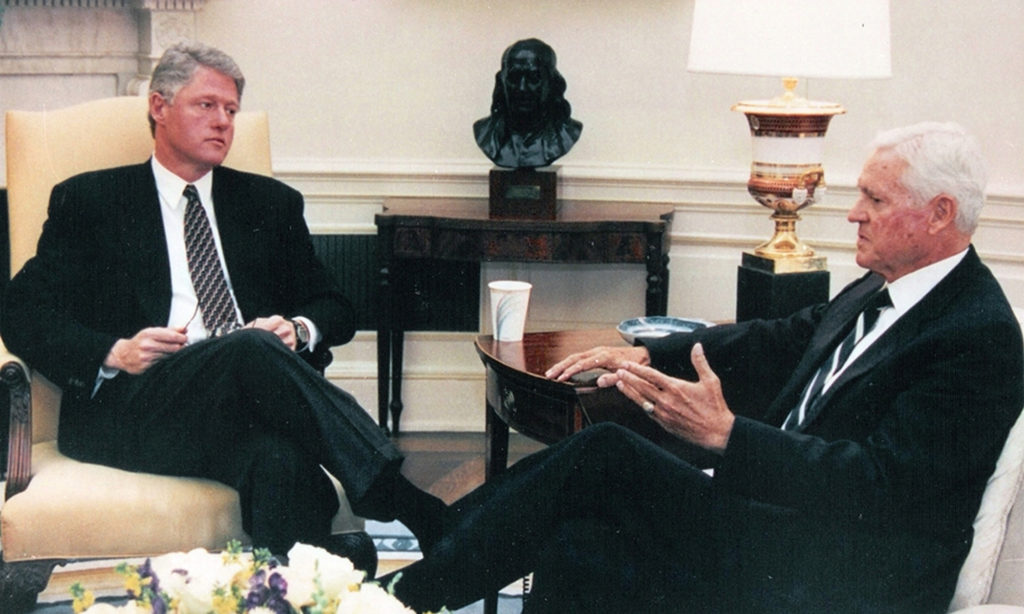
As chairman or ranking member of the Senate Appropriations subcommittee overseeing the Justice Department, Hollings authored or co-authored every law enforcement funding bill from 1977 until his retirement, regularly steering federal investment to bolster and modernize South Carolina’s law enforcement capabilities. Both before and after 9/11, he fought to secure America’s population and economic infrastructure against terrorist attack, with special attention to America’s ports and its aviation system.
- Authored the Maritime Transportation Security Act, signed into law November 2002
- Authored the Aviation Transportation Security Act, signed into law October 2001
- Wrote or co-wrote every law enforcement funding bill from 1977 until his retirement
- Led effort to fund innovative law enforcement programs like the COPS program, School Resource Officers, “Weed and Seed,” and the Safe Schools initiative
- Steered substantial resources to help South Carolina modernize its law enforcement operations, including funding for a high-tech DNA lab, an advanced communications system, bullet proof vests, law enforcement vehicles, etc.
- Brought the National Advocacy Center to Columbia
- Brought the U.S. Border Patrol Academy to Charleston
- Established the nation’s first Computer Crime Center in Columbia
- Established Project Seahawk in Charleston, the nation’s first port security, command and control center
- Authored the American Home Fire Safety Act and is a lead co-sponsor of the Staffing for Adequate Fire and Emergency Response Act (SAFER)
- Played a critical role in passage of the FIRE grant program which provides federal resources to local fire departments for training and equipment
TRADE AND MANUFACTURING: Standing Up for American Jobs
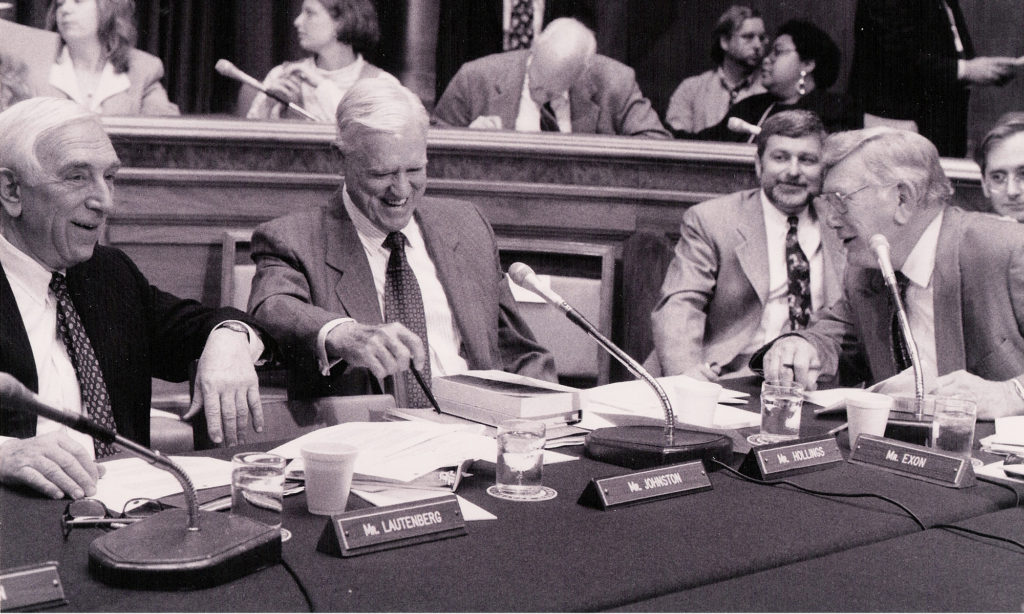
Alarmed by the erosion of America’s manufacturing backbone — in particular, the textile industry — Hollings served as the Senate’s most relentless advocate of “competitive trade” policies, demanding that U.S. companies be given the same access to foreign markets that we give to others. Opposing a president of his own party, he led the fight in the Senate against NAFTA and GATT. He was the lead defender of congressional authority over trade matters, and opposed granting “fast track” negotiating authority to the president. While opposing counterproductive trade policies, he created two innovative programs to support and enhance domestic production: the Advanced Technology Program and the Manufacturing Extension Partnerships program within the Department of Commerce.
- Led congressional effort to create competitive trade policies and bolster domestic industry
- Led opposition to GATT, NAFTA, PNTR, Africa-CBI, Andean Preferences, and fast-track, each of which eroded America’s manufacturing capacity and sent American jobs overseas
- Lead defender of congressional authority over U.S. trade matters
- Created the Advanced Technology Program, which supports public-private partnerships in cutting-edge research that provides U.S. industries with technological, competitive advantages
- Created the Manufacturing Extension Partnerships program to help small and medium-sized manufacturers compete globally
- Introduced the “Save American Manufacturing Act” and the “Jobs Protection Act,” which, respectively, enhance U.S. trade protocols and provide incentives to companies that maintain and expand domestic manufacturing
- Opposed sale of critical U.S. industries to companies owned by foreign governments.
If you want more information on Sen. Hollings’ record and legacy of service, contact the South Carolina Political Collections at the University of South Carolina
